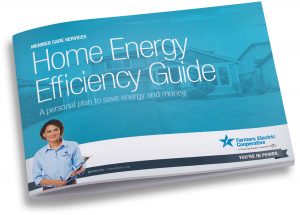
REFRIGERATORS ARE MAJOR ELECTRICITY USERS and deserve special attention.
Keep yours running smoothly with these tips:
- Although rushing out to buy a new refrigerator may not be in your budget, it is important to know that new models are more efficient and use as little as half the electricity of older units.
- Full refrigerators run more efficiently than ones that are only partially full. So, buy more food and save some energy.
- Consider the value of owning multiple fridges or an additional freezer. Maximize storage in your main refrigerator while maintaining proper air circulation. Alternatively, assess the option of replacing two older fridges with a single larger, newer, and more efficient model.
- Make sure door seals are tight. Test them by closing the door over a piece of paper or a dollar bill so it is half in and half out of the fridge. If you can pull the paper or bill out easily, the latch may need adjusting, or the seal may need replacing.
- Move the refrigerator away from the wall and vacuum its condenser coils yearly—unless you have a no-clean condenser model. Refrigerators will run for shorter periods with clean coils.
- Maintain a consistent temperature in the fridge and freezer. Recommended temperatures are 37 to 40 degrees for the fresh food compartment of the refrigerator and 5 degrees for the freezer section. If you have a separate freezer for long-term storage, it should be kept at zero degrees.
- Protect the refrigerator from high-heat sources. The compressor kicks into high gear when it’s near sources of heat, wasting energy and shortening the life span of the appliance.
- When designing your kitchen, try to keep your fridge away from the range, oven, dishwasher, or any other appliance that may emit high levels of heat. It’s also wise to keep it out of prolonged direct sunlight.
 TAKE CHARGE.
TAKE CHARGE.
Save on your Electric bill and Request our Farmers EC Home Energy Efficiency Guide in the Efficiency hub.


